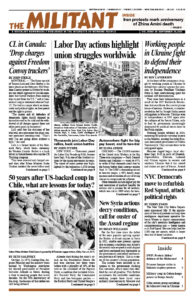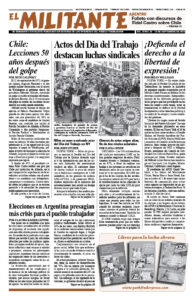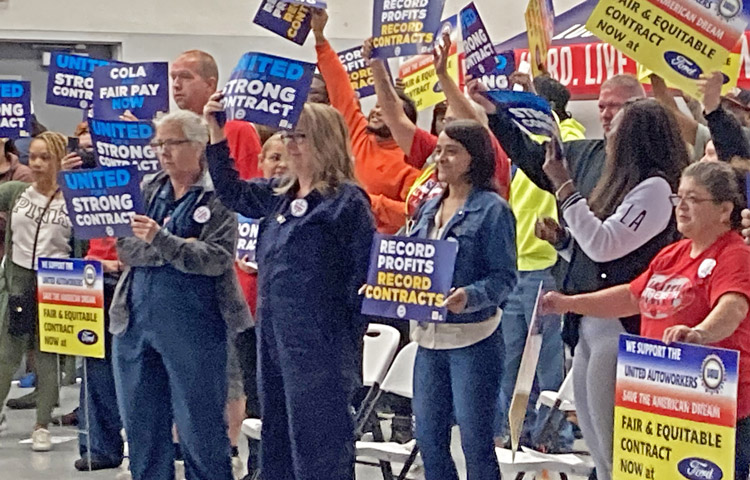CHICAGO — The 150,000 members of the United Auto Workers at the Big Three auto companies — Ford, General Motors and Stellantis — voted by 97% to strike if their demands aren’t met by the bosses before their contract expires Sept. 14. The UAW is demanding an end to two-tier wages, a 40% hourly wage increase and restoration of cost-of-living clauses to compensate for inflation.
Other demands include higher pay for and restoration of medical benefits for retirees and a pension for all workers, which was cut in 2009 when the bosses demanded concessions while being bailed out of bankruptcy by the federal government. That’s also when COLA was eliminated.
The UAW is also demanding more paid time off for workers to be with their families and to be able to participate in political and union work.
The Big Three bosses raked in a combined $21 billion in profits in just the first six months of this year. That’s on top of the $250 billion in North American profits they pocketed over the last decade.
The union is stepping up strike preparations. In Chicago, for example, hundreds attended two rallies outside the UAW’s headquarters. Union members told the Militant they’re signing up for strike benefits and to serve as picket line captains.
“The cost of living is going up and our wages stay the same. That’s a good reason to strike,” Ford worker Georgette Johnson said at a Sept. 8 strike preparation rally. “When my father worked here, he could buy a house and car and pay for everything. Now you can’t.”
Another issue looming over negotiations is what will happen to jobs in the switch over to electric vehicle production, which takes fewer workers.
The bosses insist they need to plow the admittedly high profits they’ve been making into stepped-up retooling to make this shift. They claim they’ll face increasing pressure from competitors if they don’t do so. If the union doesn’t back off, bosses threaten to move new plants to the South, where the labor movement has been weaker.
So far the companies have refused to offer anything near what the workers are demanding. Last week, Stellantis, Ford and General Motors all put forward counterproposals to the UAW. Stellantis offered a 14.5% wage increase over four years. “That doesn’t make up for inflation,” the union responded, “let alone make up for past losses, and leaves workers even further behind.”
Ford demanded the union accept a 9% wage increase, and General Motors offered 10%, over four years.
All three companies insist they have to keep the divisive tiers. They rejected union demands to reestablish cost-of-living protection and to increase pay for retirees and reestablish retirees’ health care.
“I’ve worked for Ford for 17 years,” Eddie Jakes, a team lead in the paint department at the company’s Chicago plant, said. “Back in 2008-09 we gave Ford concessions. Now it’s time to pay us back. That blank check has come due.”
This labor battle is in the interest of all working people! Join in the fight and build solidarity!
Ned Measel from Cincinnati contributed to this article.


